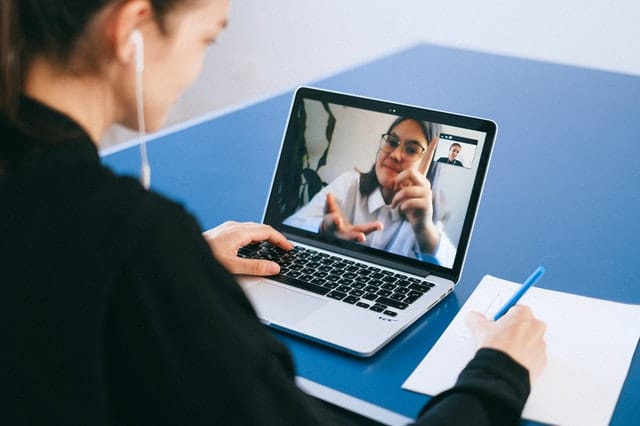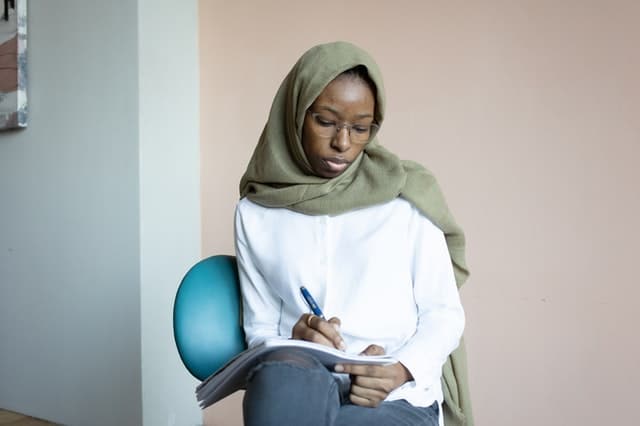5 Tips for Conducting Remote Interviews for a Family History Book
November 12, 2021
“A good laugh makes any interview, or any conversation, so much better.” — Barbara Walters
A family history book is very much like an onion. There are many layers to uncover. Each layer comes off one at a time. Often, individual family members and close friends hold the essence of each layer. It would be impossible to put together a faithful rendering of the family’s history without that essence.
An effective technique used to peel back those layers is conducting interviews.
Interviews can help collect first-hand accounts and corroborate information. Moreover, interviews can fill in the gaps left by documentary evidence. After all, papers can only reveal so much, and photographs do not tell the entire story.
With family members spread out across the country, or even the world, remote interviews are a viable alternative for face-to-face communication. But what is the best way to conduct those interviews?
Five Tips for Conducting Remote Interviews for a Family History Book
Tip #1: Have a game plan.
Often, family historians intend to cover as much ground as possible. They seek to get as much information as they can. After all, time is precious, particularly with older relatives.

However, trying to cover too many bases may lead to losing focus. Therefore, it is essential to have a clear game plan before conducting the first interview.
A game plan consists of understanding where the book is heading. For instance, a family history book may center on the family’s journey to America.
As a result, the information needs to home in on that specific episode in the family’s history. Any other information, while useful, may digress from the main story. Ultimately, deviating from the book’s focus may defeat its purpose.
With a clear goal in mind, interviews should aim to shed light on the book’s purpose. Forbes Magazine columnist Shel Israel recommends preparing before an interview. In his view, being prepared saves wasting time. Focusing on the conversation allows the interviewer to focus on the relevant information. This approach begins with careful preparation.
Family historians need to prepare before going into an interview. That preparation begins with understanding who the family member is and what they have to offer. From there, family historians can craft interview questions that will help them peel back one layer, or even multiple layers.
A good rule of thumb is to evaluate what all relatives have to offer. Often, each member has a piece of the puzzle needed to articulate the full picture. Then, conducting interviews just becomes a question of fitting each piece. In the end, the whole puzzle will begin to take shape.
Tip #2: Embrace remote interviews.
Traditional interviews involve a face-to-face sit-down. However, circumstances may not allow an old-fashioned in-person talk. Therefore, family historians must embrace the use of remote interviews.
In the past, remote conversations took place over the phone.
While that approach continues to be valid, technology has afforded family historians new tools.
For instance, video conferencing technology can facilitate a more intimate conversation.

One very important reason video conferencing calls are pivotal is that video calls allow interviewers to create a more comfortable and personal atmosphere.
The following tidbit from a Harvard Business Review publication offers wonderful insight into this topic:
“There’s a great deal of hand-wringing over all that’s lost when screens intermediate our interactions. But there is a certain intimacy that screens can actually facilitate. During a remote interview, the interviewer and interviewee are sitting inches from one another’s faces. The screen creates a sense of psychological safety that may allow people to open up more than they might in person.”
Indeed, a video screen can provide an unparalleled sense of closeness. Moreover, a screen can provide enough proximity to make things more personal, despite the physical distance.
Please bear in mind that the subject matter has a deep connection with each individual. Every life story has a profound significance to everyone connected.
Thus, it makes sense to approach remote interviews with the same warm touch a face-to-face discussion would hold.
The most powerful angle to a remote interview lies in utilizing video to convey facial expressions and physical gestures. A phone call cannot replicate these features. Consequently, using video conferencing to its fullest allows the interviewer to build rapport with the interviewee.
Tip #3: Prepare interview questions in advance.
A successful interview begins with preparing questions in advance. The questions must help the interviewer focus on the information needed to cover the topic at hand. As such, questions should focus on particular points. Painting with a broad brush may lead the conversation astray.
This tip opens the discussion for two specific situations.

The first situation pertains to delivering interview questions before the interview. The rationale behind this approach lies in giving the interviewee advance notice to prepare.
This approach works well, especially with busy people. Additionally, providing interview questions in advance sets the tone for the interviewer’s expectations.
As a result, the interviewee will be aware of what information the interviewer seeks to obtain.
The second situation pertains to allowing freedom throughout the interview. This school of thought allows the interviewee to speak their mind freely. Consequently, the interviewee can take the lead, providing the information they consider relevant to the question and conversation.
When considering both positions, it is best to find a balance between freedom and directing the conversation. The interviewer must be proactive in guiding the conversation to avoid losing precious time on irrelevant or perhaps repetitive items. Ideally, the interviewer should be tactful in bringing the conversation back to its main objective.
Author and photographer Brandon Stanton offers this highly insightful thought: “Interviewing someone is a very proactive process and requires taking a lot of agency into your own hands to get past people’s general self-preservation mode.”
Undoubtedly, some folks may feel defensive when talking about their lives. This “self-preservation mode” might become active, particularly when meeting someone for the first time. Thus, a good interviewer must allow the speaker enough freedom to feel comfortable but become proactive enough to avoid losing focus. Therefore, preparing interview questions in advance can provide the structure needed to avoid losing direction.
Tip #4: Take as many notes as possible.
In-person or remote interviews have the potential to deliver copious amounts of information. However, once the information is out in the open, the interviewer must capture it before it disappears. This phenomenon underscores the need for notes.
When taking notes, it is crucial to let the interviewee know about them beforehand. Otherwise, the interviewee may become defensive and enact their 'self-preservation mode.'
After all, it is one thing to speak one’s mind. Nevertheless, it is a completely different thing to have their words on record.

Initially, interviewers must communicate their intention to take notes. In doing so, the interviewer can provide forewarning so that the interviewer feels comfortable providing their answers.
Consider this situation:
Therapists always manifest their intention to take notes. The rationale is to provide the patient with a comfortable atmosphere. This atmosphere should be conducive to open discussion. Nevertheless, there are instances in which patients may feel self-conscious. As a result, they may request that their therapist refrain from taking notes.
Based on this scenario, what should an interviewer do?
First, interviewers must communicate their plan to take notes. The interviewer must ask the interviewee if they feel comfortable with notetaking. In some cases, it may be necessary to sign legal paperwork, particularly a non-disclosure agreement, due to the information’s sensitivity.
Next, interviewers need to be honest and transparent.
There is nothing wrong with sharing the notes’ contents. In doing so, the interviewee can feel more comfortable about what they are sharing. It may also be necessary to take a break to share notes. Moving forward, the interviewee can relax and continue with the interview.
While note-taking is a great tool, it can be time-consuming and distracting from the conversation. As such, some interviewers prefer recording interviews. Nevertheless, this approach opens up an entirely new set of considerations.
To begin with, recording an interview requires due authorization from stakeholders. As such, interviewers may need legal paperwork to proceed. Specifically, privacy laws apply.
Consequently, consent on the interviewee’s part is essential. Also, all sides must determine who will hold the rights to the recording. Generally speaking, the rights should belong to the book’s author. In the event of co-authors, then rights may be shared.
Additionally, all parties must agree on the recording format. For in-person interviews, audiotape recordings are the norm. Nevertheless, videotaping may also be an option, particularly if there is a video component to the story. The same rules apply to remote interviews.
Please keep in mind that the worst approach is committing information to memory. Much of it can fall through the cracks when there is a great deal of information swirling around. Thus, leaving vital information up to memorization will essentially lead to lost details. Therefore, the best approach, whenever possible, is to record interviews for later review. Alternatively, taking notes is the best way to go.
Tip #5: Hire a ghostwriter.
Family historians may need a helping hand at some point in the process. This is where hiring a ghostwriter comes into play.

Professional ghostwriters come with varying skill sets.
Some ghostwriters are adept at putting pen to paper. Others may have experience in conducting interviews.
Although the question begs, why hire a ghostwriter in the first place?
Ghostwriters are professional writers that can help family historians bring their projects to fruition.
Particularly, family history projects can become quite extensive. Therefore, bringing on a ghostwriter can help facilitate the process.
A ghostwriter can provide support in two main ways.
First, a ghostwriter can help conduct interviews. Involving a ghostwriter in the interview process is important. After all, the ghostwriter might end up writing the bulk, if not all, of the book. Thus, involving a ghostwriter in the interview process makes sense.
In contrast, some family historians prefer to give their ghostwriter only the material they need. That approach is fine, especially when there are privacy concerns.
Second, a ghostwriter may have experience conducting interviews. For example, ghostwriters with a journalism background may have the sort of expertise necessary to conduct interviews. Then, the ghostwriter can get to work on drafting the manuscript.
Please remember that hiring a ghostwriter is an investment in time and effort. Often, family historians may not have the time or the availability to conduct interviews and then sit down to write. As a result, hiring a ghostwriter can save time and effort, leading to a finished family history project.
Conclusion
Completing a family history book requires time devoted to research. Research is crucial to peeling back the layers of the family history onion. Without adequate research, it may be nearly impossible to uncover the full details of a family’s true history and identity.
Conducting interviews is an integral part of the research process. Therefore, careful attention is necessary when going about interviews. Given today’s circumstances, embracing remote interviews may prove the best approach, especially when family members are in various locations around the country and the world.
Nevertheless, the scope of a family history project may require the assistance of a professional ghostwriter.
Beyond writing, a professional ghostwriter can help conduct interviews, as well. An experienced ghostwriter may have the skillset needed to conduct interviews, collect information, and put a manuscript together. Ultimately, a ghostwriter’s help can take a family history project and bring it to fruition.































